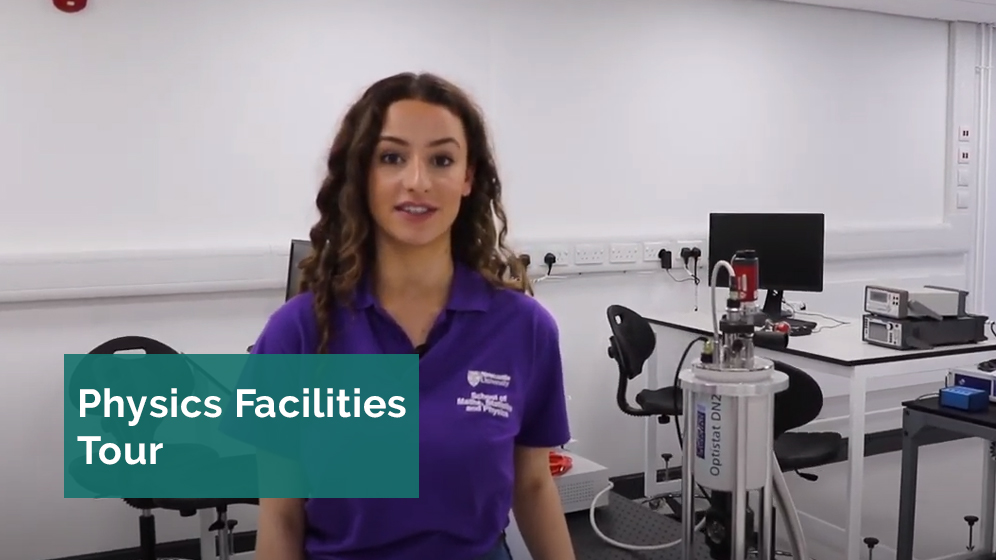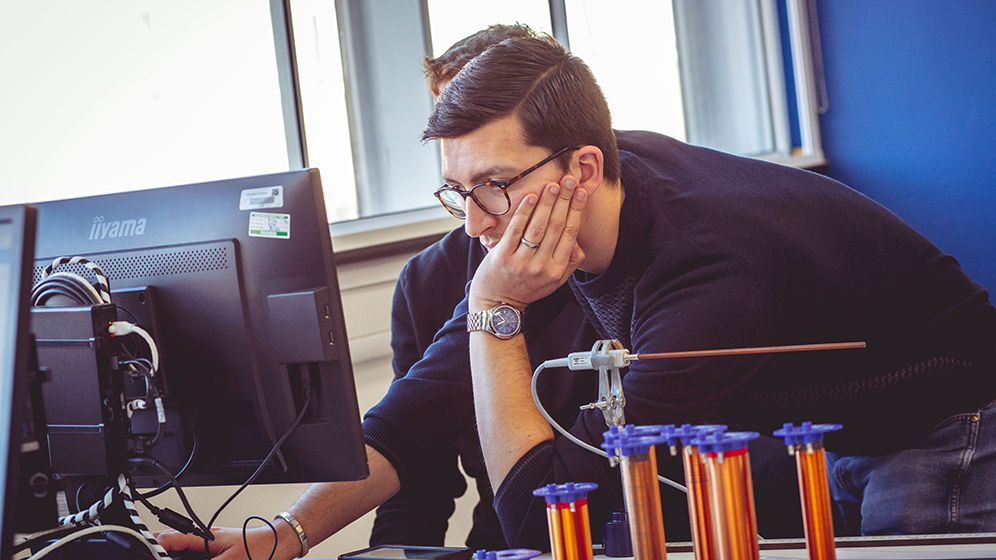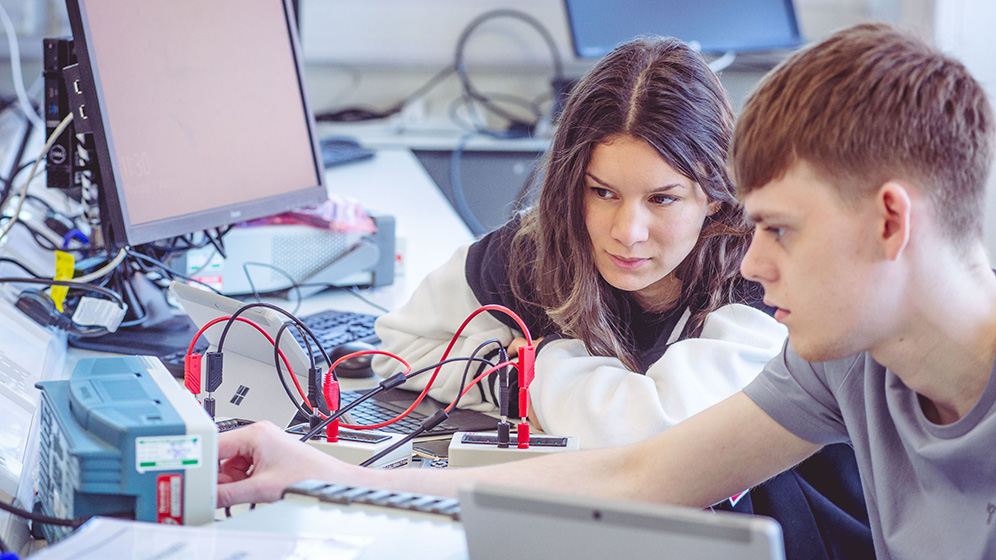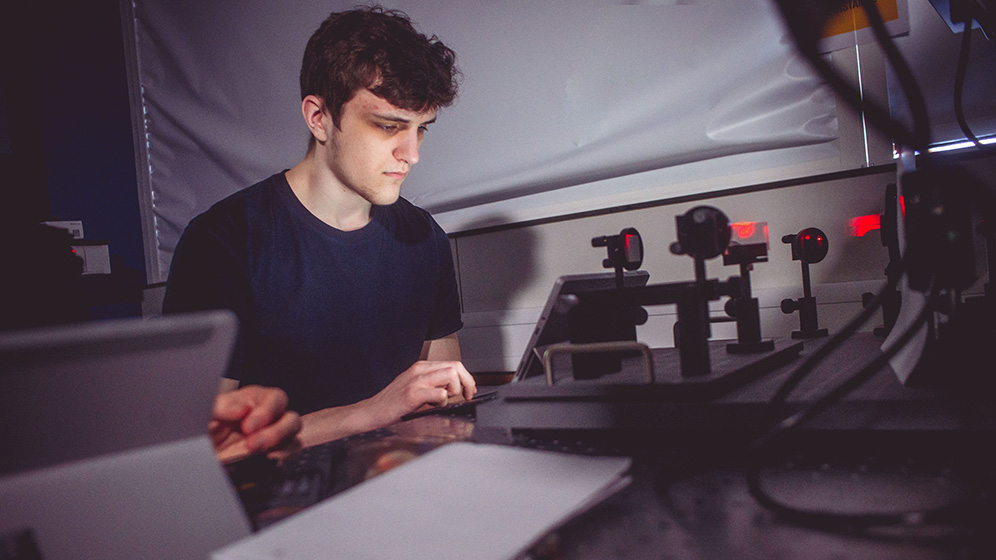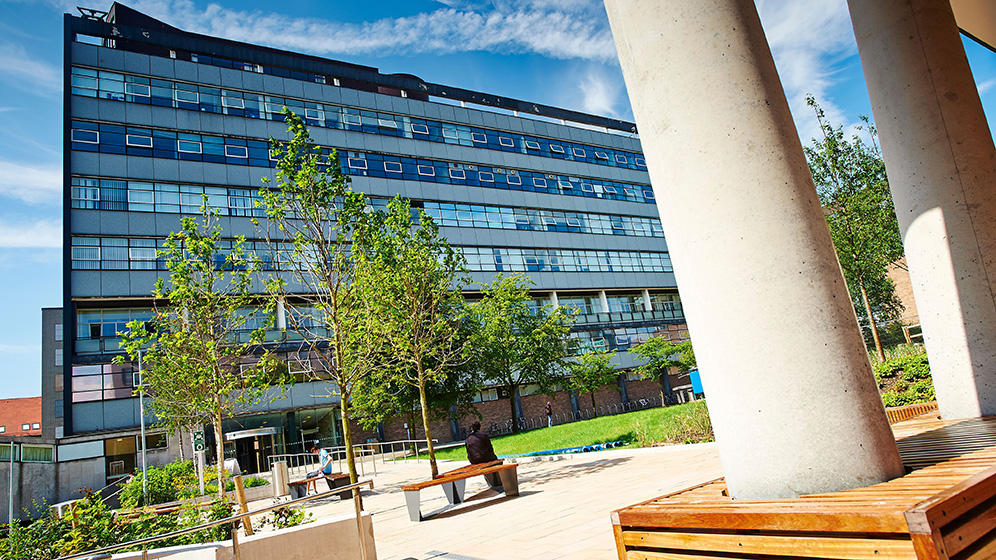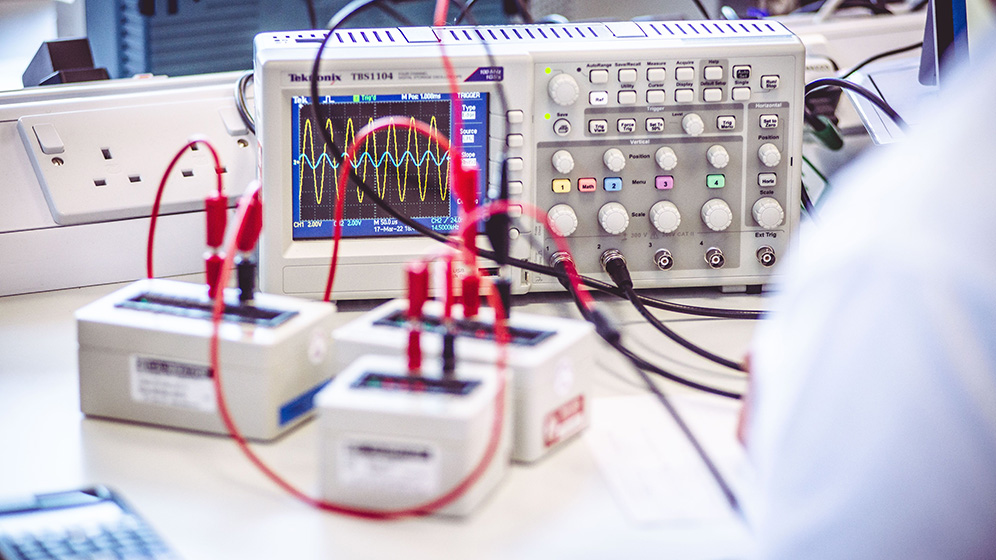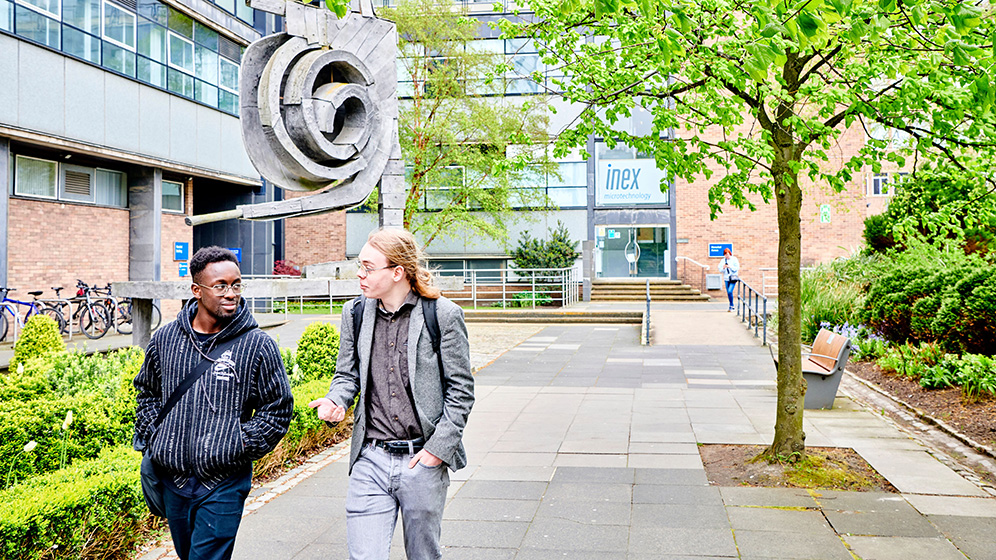Physics with Foundation Year BSc Honours
- UCAS code: F304
- Full time
- 4 years
Our Physics with Foundation Year BSc will prepare you for one of our Physics BSc or MPhys degrees, opening doors to diverse career paths across a range of industries.
You are currently viewing course information for entry year: 2026
Next start date:
- September 2026
UCAS Institution name and code:
- NEWC / N21
Course overview
This foundation year will help you develop the knowledge you need to progress to one of our Physics BSc degrees.
No physics or mathematics A-Level needed. This foundation year is designed for students without A-Level (or equivalent) qualifications in mathematics or physics. It will provide you with the essential knowledge needed to progress to a Physics BSc or MPhys degree.
The full-time programme covers core topics in physics and mathematics, including:
- mechanics
- statistics
- materials science
- electrical circuit analysis
You'll also explore fundamental physics concepts such as:
- forces
- energy
- atomic structure
- radioactivity
- chemistry
- data analysis
- computational techniques
Progression
On completion of the foundation year, you're guaranteed a place in Stage 1 of these degrees:
- Physics BSc Honours
- Theoretical Physics BSc Honours
- Physics with Astrophysics BSc Honours
- Physics MPhys
- Theoretical Physics MPhys
- Physics with Astrophysics MPhys
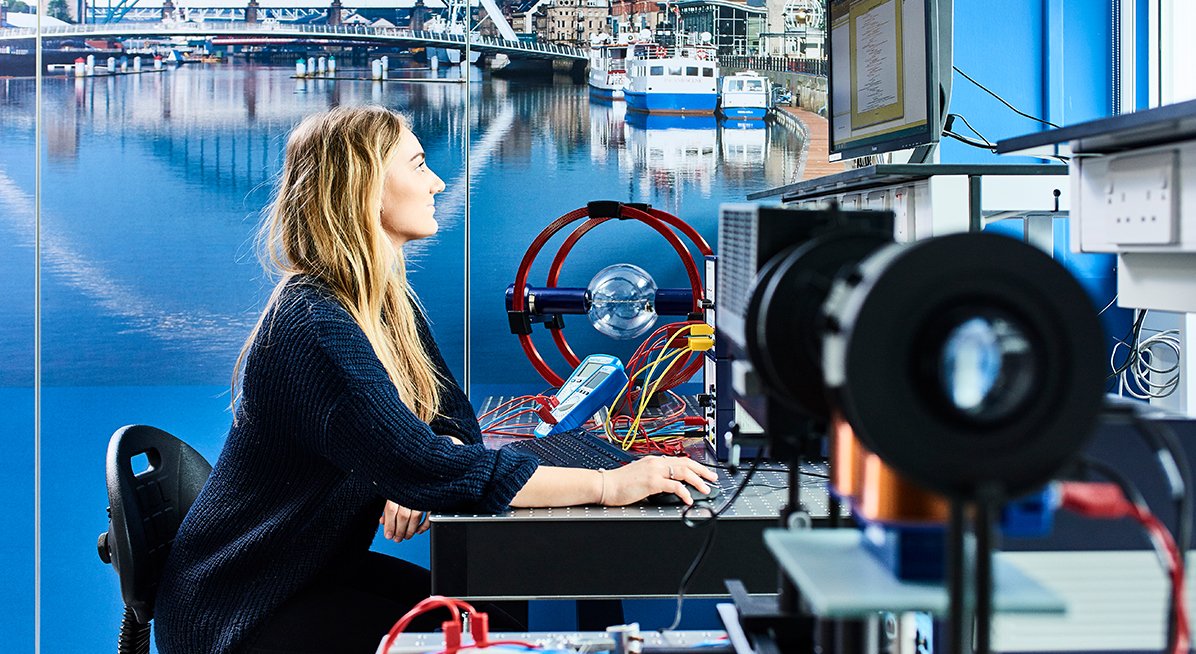
Your course and study experience - disclaimers and terms and conditions
Please rest assured we make all reasonable efforts to provide you with the programmes, services and facilities described. However, it may be necessary to make changes due to significant disruption, for example in response to Covid-19.
View our Academic experience page, which gives information about your Newcastle University study experience for the academic year 2025-26.
See our terms and conditions and student complaints information, which gives details of circumstances that may lead to changes to programmes, modules or University services.
Quality and ranking
Professional accreditation and recognition
All professional accreditations are reviewed regularly by their professional body.
Modules and learning
Modules
The information below is intended to provide an example of what you will study.
Most degrees are divided into stages. Each stage lasts for one academic year, and you'll complete modules totalling 120 credits by the end of each stage.
Our teaching is informed by research. Course content may change periodically to reflect developments in the discipline, the requirements of external bodies and partners, and student feedback.
Optional module availability
Student demand for optional modules may affect availability.
Full details of the modules on offer will be published through the Programme Regulations and Specifications ahead of each academic year. This usually happens in May.
To find out more please see our terms and conditions
You'll cover core topics including foundation mathematics, foundation physics and an individual project.
Modules
Compulsory modules
- Electricity and Magnetism (10 credits)
- Group Project (10 credits)
- Mechanics (10 credits)
- Introduction Computing (10 credits)
- Core Mathematics A (30 credits)
- Core Mathematics B (30 credits)
- Concepts in Thermal and Quantum Physics (10 credits)
- The Physics of Oscillations (10 credits)
We base these figures and graphs on the most up-to-date information available to us. They are based on the modules chosen by our students in 2024-25.
Teaching time is made up of:
- scheduled learning and teaching activities. These are timetabled activities with a member of staff present.
- structured guided learning. These are activities developed by staff to support engagement with module learning. Students or groups of students undertake these activities without direct staff participation or supervision
Teaching and assessment
Teaching methods
You'll be taught via a range of approaches, including:
- lectures and seminars
- small group tutorials
- problem classes
- laboratory sessions
- practical computing sessions
You'll also engage in independent study. You'll receive support and guidance on selecting and using relevant reading materials effectively.
Assessment methods
You'll be assessed through a combination of:
-
Assessments
-
Examinations – practical or online
-
Projects
-
Reports
Skills and experience
Practical experience
This foundation year will prepare you for Stage 1 of our Physics BSc and MPhys degrees. It'll equip you with skills that are in demand by employers across the globe.
Using our high-spec facilities, and working alongside our expert staff, you'll:
- gain experimental experience in our state-of-the-art laboratories
- work on lab and project-based modules, based on real-world challenges
- develop analytical and computational skills, using industry-relevant software
- enhance your written and oral communication skills
- learn from experts in the field at a leading Russell Group university
Business skills
Physics graduates are highly valued for their transferable skills. You'll graduate with strong abilities, including:
- problem-solving
- a logical, analytical mindset
- big data analysis
- communication
- teamwork
You'll also learn how to present data in numerical, graphical and tabular form. You'll select and process data to provide relevant information for technical problems.
Research skills
You'll benefit from our interdisciplinary approach and the diverse research strengths of our expert academic staff. We have research expertise in:
- novel electronic materials
- semiconductor devices
- nanoscale properties of materials
- computational physics
- quantum fluids
- quantum matter
- observational astrophysics
- astrophysical fluids
- cosmology
- quantum gravity
Explore the research we're doing in the School of Mathematics, Statistics and Physics
Student stories
Adam, a 2022 graduate, shares the highlights of his course, why he chose Newcastle, and advice for new students.
Facilities and environment
Facilities
As a physics student at Newcastle University, you'll be based at our city-centre campus in the School of Mathematics, Statistics and Physics' Herschel Building.
The School has high-specification laboratory facilities equipped with leading experimental and computational physics capabilities, such as:
- cryogenics labs
- semiconductor labs
- High-Performance Computing
- data from the Large Synoptic Survey Telescope
The Herschel Building also has dedicated study and social spaces, and a computing area.
Support
We take your health and wellbeing seriously and are committed to supporting you throughout your studies so you can fulfil your potential at university. This support includes:
- a personal tutor who is an academic member of staff who can help you with academic and personal issues throughout your degree
- a peer mentor scheme which pairs you with a current student from your course to help you navigate your first year at university
- a staff-student committee, to give you an opportunity to have a say in how your degree works
- Student Wellbeing Advisors who can offer comprehensive listening and support and signpost you to other University support services or external support agencies
Transition Officer
A dedicated staff member is here to support you in transitioning from school to university study.
The Transition Officer works with Stage 1 undergraduates to provide:
- Stage 1 pastoral and academic support
- attendance and academic performance monitoring
- Stage 1 induction
- weekly drop-ins
You'll also benefit from our:
- induction programme, including social events, to help you settle in quickly
- activities and events run by our student-run society, PhysSoc
- peer supported academic drop-in sessions to help with assignments
Your future
We have research links with the following companies and external organisations:
- Littelfuse
- the De Beers Group
- DEFRA
- STFC
- NASA
- LOFAR
- intel
- CPI
Graduating with a degree in physics
Possible career paths for physics graduates include:
- engineering
- medicine
- finance
- nanotechnology
- oil, gas and renewable energy
- telecommunications
You'll gain transferable skills that are highly valued by employers such as problem-solving, analytical, mathematical, communication, presentation, teamwork and computing skills.
Further study, including postgraduate courses for secondary school teaching and PhD courses, are further options available to physics graduates.
This Foundation Year provides a pathway into our Physics BSc and MPhys courses. Our degrees lead to a range of career opportunities across diverse industries.
Previous graduates from our Physics courses have gone onto roles within 15 months of graduating, including:
- Technical Graduate at DXC Technology
- Electric Vehicle Finance Proposition Manager at HSBC
- Secondary Science Teacher at Laidlaw Schools Trust
- Trainee Clinical Scientist at NHS
- Graduate Data Engineer at Serios Group
- Graduate Physicist at Tracerco Business Consultant at EY
- Commercial Financing Executive at Lindt
Make a difference
Sorry, you need JavaScript to view this video
Careers support
Our Careers Service is one of the largest and best in the country, and we have strong links with employers. We provide an extensive range of opportunities to all students through our ncl+ initiative.
Visit our Careers Service website
Recognition of professional qualifications outside of the UK
If you’re studying an accredited degree and thinking about working in Europe after you graduate, the best place to find current information is the UK Government’s guidance on recognition of UK professional qualifications in EU member states. This official resource explains whether your profession is regulated in another country, what steps you need to take, and which organisation you should contact.
Entry requirements
All candidates are considered on an individual basis and we accept a broad range of qualifications.
The entrance requirements and offers below apply to 2026 entry.
| A-Level | |
|---|---|
| International Baccalaureate | |
|---|---|
Other UK and the Republic of Ireland qualifications
Alternative offers at Newcastle
Through one of our contextual or alternative offer routes, you could receive an offer of up to three grades lower than the typical requirements.
Contextual offers
We use certain contextual data from your UCAS form, alongside your application, to consider challenges that you may have faced in your education and the potential effect this may have had on your qualifications. This means you may be eligible to receive a lower contextual offer.
PARTNERS offers
One of the largest and longest support entry routes to university of its kind for students from underrepresented backgrounds. We support applicants from application through to study.
Realising Opportunities offers
A unique programme delivered in collaboration with 10 leading, research-intensive universities in the UK. The programme is open to students in Year 12/first year of college.
Pathways to Newcastle offers
Pathways to Newcastle, our national skills entry route, is available for specific subject areas.
High Performance Athletes
We support promising athletes at the application stage, who compete in regional, national or international levels in their sport.
Qualifications from outside the UK
English Language requirements
Entrance courses (INTO)
International Pathway courses are specialist programmes designed for international students who want to study in the UK. We provide a range of study options for international students in partnership with INTO.
These courses are specifically designed for international students who want to study in the UK and progress onto one of our undergraduate degrees. Our International Study Centre, has a range of study options including:
- International Foundation
- International Year One
- English Language courses
Find out more about International Pathway courses
Admissions policy
This policy applies to all undergraduate and postgraduate admissions at Newcastle University. It is intended to provide information about our admissions policies and procedures to applicants and potential applicants, to their advisors and family members, and to staff of the University.
University Admissions Policy and related policies and procedures
Credit transfer and Recognition of Prior Learning
Recognition of Prior Learning (RPL) can allow you to convert existing relevant university-level knowledge, skills and experience into credits towards a qualification. Find out more about the RPL policy which may apply to this course.
Tuition fees and scholarships
Tuition fees for academic year 2026-2027
The 2026 entry home fees have not yet been confirmed.
| Qualification: BSc Honours | |
|---|---|
|
Home students full time 4 years |
Tuition fees (Year 1)
Not set |
|
International students full time 4 years |
Tuition fees (Year 1)
31,500 |
Year abroad and additional costs
For programmes where you can spend a year on a work placement or studying abroad, you will receive a significant fee reduction for that year.
Some of our degrees involve additional costs which are not covered by your tuition fees.
Scholarships
Find out more about:
Open days and events
You'll have a number of opportunities to meet us throughout the year at our on-campus and virtual open days.
You'll be able to:
- explore our beautiful campus
- find out about our vibrant city
- discover what students think about studying at Newcastle
You'll also have the opportunity to speak to academic staff and find out more about the subjects you're interested in.
Find out about how you can visit Newcastle in person and virtually.
We regularly travel overseas to meet with students interested in studying at Newcastle University. Visit our events calendar to find out when we're visiting your region.
How to apply
Apply through UCAS
To apply for undergraduate study at Newcastle University, you must use the online application system managed by the Universities and Colleges Admissions Service (UCAS). All UK schools and colleges, and a small number of EU and international establishments, are registered with UCAS. You will need:
- the UCAS name and institution codes for Newcastle University (NEWC/N21)
- the UCAS code for the course you want to apply for
- the UCAS 'buzzword' for your school or college
If you are applying independently, or are applying from a school or college which is not registered to manage applications, you will still use the Apply system. You will not need a buzzword.
Apply through UCASApply through an agent
International students often apply to us through an agent. Have a look at our recommended agents and get in touch with them.
Get in touch
By phone
Call us on +44 (0) 191 208 3333 and press option 1. Our opening hours are Monday to Friday 10am until 4pm.
Live chat
Our NCL chatbot might be able to give you an answer straight away. If not, it’ll direct you to someone who can help.
You'll find our NCL chatbot in the bottom right of this page.
Online
Chat to our students
Choosing a university is a big decision. If you've got questions about a particular course, student life or the city of Newcastle, why not chat to our friendly students or graduates!
Keep updated
We regularly send email updates and extra information about the University.
Receive regular updates by email


